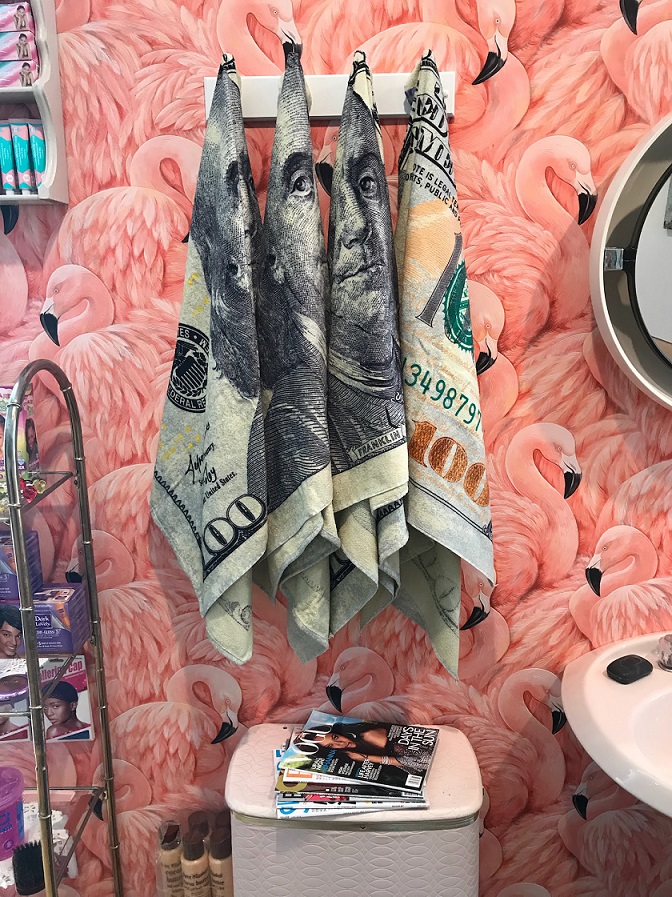The Bank Secrecy Act, created in 1970 to prevent money laundering in major financial institutions, could be extended to the art and antiquities market.
Detail of Genevieve Gaignard installation “Be More” (2018) at the FLAG Art Foundation (photo by Benjamin Sutton/Hyperallergic)
A new bill introduced in the United States House of Representatives in May would extend the Bank Secrecy Act to the art and antiquities market, potentially costing dealers millions of dollars while bringing regulation to an industry often portrayed as a haven for money laundering and other financial crimes.
Created in 1970, the Bank Secrecy Act (BSA) is supposed to prevent money laundering in major financial institutions by requiring them to, among other things, keep records of cash purchases and file reports against suspicious activity and abnormally high transactions exceeding $10,000. Penalties for those who fail to file reports can be extremely high. (Last year, a small community bank in Texas was fined $2 million for doing business with a Mexican bank that moved hundreds of millions of dollars in bulk shipments that would have required greater scrutiny and due diligence.)
In a statement to Artsy, the Art Dealers Association of America (ADAA) wrote, “This could impose an unnecessary and onerous regulatory burden on galleries — small businesses all across the country that do not have the infrastructures or resources required to undertake the reporting and attendant filing for something that has not presented itself as a major problem.”
The ADAA advocates on behalf of art dealers, but its statement minimizes the prevalence of money laundering issues in the arts. Speaking with artnet News, attorney Michael McCullough acknowledged that the extension of the BSA would have a major effect on dealers of all sizes, but noted that major auction houses like Sotheby’s and Christie’s already have anti-money laundering protocols in place. Currently, though, it is unclear if extending the BSA to the art and antiquities market would have a direct effect on the auction houses.
On that note, Irina Tarses, founder and director of the Brooklyn-based Center for Art Law told Hyperallergic that it is perhaps too soon to judge the real effect of the law because it hasn’t even gone through the markup phase in the Financial Services Committee yet. Without a full draft, it’s hard to forecast any specific effects of the law. Nevertheless, Tarses applauds the new law for “addressing money laundering in the art market and ensuring that dealers know their clients is a positive development in [a market] that is very resistant to regulations and transparency.”
Leila Amineddoleh, a lawyer specializing in issues of art and cultural heritage, applauds the potential new measures. She has even helped draft letters of support for it. In a statement to Hyperallergic, she said:
The art market continues to grow as more and more people view art as an investment. Whereas this isn’t inherently a legal or criminal problem, the nature of the market has changed, meaning that art market players are taking on roles typically devoted to financial institutions. An increasing number of merchants loan money to clients and lend against art, meaning that sums of money are moving under the radar. With vast amounts of money circulating on an unregulated art market, it has become the perfect place to launder money. Anonymity and secrecy in the art market also isn’t necessarily bad, but some players have exploited the opaque nature of the art world to engage in criminal activity. For this reason, federal regulations are long overdue. There is no reason for art dealers to be exempt from regulations pertaining to dealers of valuable commodities. It will be particularly interesting to see how the Act defines “dealer.” There are collectors who are not technically dealers who trade in millions of dollars of art each year.
Sure enough, the art market has seen its fair share of financial malfeasance and contraband in the last few years. Infamously, Hobby Lobby’s CEO bought thousands of illegally obtained objects, many smuggled from Iraq, to fill their Bible Museum in Washington DC. More recently, London-based dealer Matthew Green was indicted in February 2018 for allegedly laundering money through a securities fraud with the sale of a $9 million Pablo Picasso painting.
While effects on the market are becoming clearer, the motivations behind the bill’s introduction are murkier. Presented to the House by Republican Congressman Luke Messer, there doesn’t seem to be an immediate link between the southeastern district he represents in Indiana and a preponderance of issues in the art market. He is also the sole sponsor of the bill. Messer is likewise a member of the Financial Services Committee which must review the measure before it is presented to the House for a vote. With Messer having a significant pull on the bill’s survival, the extension of the BSA could be an easy win for the congressman who’s had trouble stepping out of the shadow of his predecessor, Vice President Mike Pence. (Then again, this is also the same man who made headlines earlier in May for sending the Nobel Prize Committee a formal nomination for Donald Trump to win the award.) The congressman did not respond to Hyperallergic’s request for comment, nor has he responded to any other media outlet’s questions about the bill.
